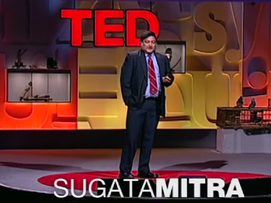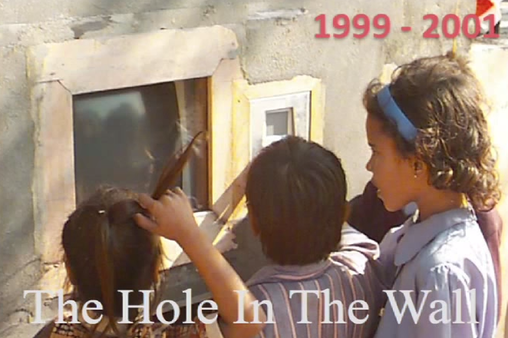How does Sugata Mitra's work have relevance to yours?If children have interest, education happens.  Nothing like listening to a great podcast during a nice long run. Podcasts offer us breaks in reading, yet have the same power in regards to teaching us things that we may not know or want to further explore. I was recently listening to an excellent Ted Radio Hour podcast. An important question that was posed had to do with the way that people genuinely learn and how their minds and bodies assimilate lessons from the world around them. The first part of the podcast centered on an incredible experiment conducted by Sugata Mitra, a professor of educational technology at the University of Newcastle. In 1999, he was asked to set up an experiment that would explore how people interact with computers in public spaces. Sugata is from India and decided that he would add a bit of a twist to this experiment by positioning the computer just 3 feet off the ground, in a hole, in the wall of a slum, in a small town. He ultimately wanted to see how poor kids with no English and no previous experience with a computer or the internet would interact with it using only a mouse. He simply had it installed and left it there, but was closely observing with cameras and audio through a remote desktop that he had set up. He was able to closely observe from afar. Included in the podcast was actual audio of curious and excited voices, working together in a tone that seemed to indicate genuine collaboration in action. Within hours of leaving the computer, he could see that changes were taking place. Programs were starting to be used, English words starting to be written (an amazing feat considering he had not left a keyboard). Astonished, he jumped up and rushed back to the place that the computer was installed and determined that the kids had figured out how to use the internal character map to begin to write out words. A colleague of Mitra’s said the explanation was simple, an older person with computer experience must have strolled by and taught the kids how to use the mouse to navigate around the computer. This person must have obviously taught them other things as well. Mitra then decided to repeat the experiment in several different parts of India (which he later extended to several different poor areas around the world). The results were the same. Poor young kids who had access to these computers were able to teach themselves many things. In one experiment, he went back to a village two months after leaving the computer there and was told by the kids that they wanted a faster processor and better mouse! He asked how they had learned about this and they responded with “You’ve given us a machine that works only in English, so we had to teach ourselves English in order to use it”. Sugata said that it was the first time as a teacher that he heard the phrase, “We had to teach ourselves” used so causally. This was a huge turning point for him and his research. Sugata felt that he had a chance to change the way we think about learning and the perceptions many educators hold about how we teach things to kids. Perhaps, as Sugata believed, much of what young people learn could happen on its own. He set out to prove whether or not he could achieve his aim. I won’t go into further details about Sugata and his work, but if you want to find out more, view his Ted Talk below or click on the Ted Radio link. http://www.podcasts.com/npr_ted_radio_hour_podcast/episode/unstoppable-learning As I listened to the podcast, I couldn’t help but think about how learning takes place in PE. Is it possible for learning to happen on its own? Obviously our teaching environment could never be set up in a similar way that Sugata had created the computer experiment in poor areas of India and other parts of the world. However, to what extent are some of his ideas and beliefs repeatable in a PE environment?
Although I try to set up a learning environment that allows students choice and ownership over their learning, everything we do is firmly rooted in important student learning outcomes in any unit that I teach. I give them a specific direction and purpose before setting them free (in a clearly structured manner). I’ve seen kids be able to develop their skills and show understanding of important concepts when allowing them a certain extent of freedom within their learning. Setting them free does not mean that I am no longer actively involved in the process of their learning! This is where I think my best teaching happens. As I think more about Sugata’s work, I am left wondering if it has more relevance to our teaching and to the learning of our students than we may believe? I must stay focused on 'WHY' I want to understand this independence and ownership of learning in PE in order to better understand and evaluate the true effectiveness of my approach. My ‘why’ is all about creating long term behavioral change in regards to young people leading more physically active lives and making healthier choices. This is ‘why’ I teach PE and ‘why’ I will continue to do whatever I can to deepen my own learning about the most effective ways to teach young people. So, I leave you with these three questions? A) To what extent do you agree or disagree that unstoppable learning can happen in PE if we set up our teaching environment accordingly? B) In what ways have you allowed student choice and ownership over learning in your PE program? What has been the result? C) How do we know our programs are having the effect that we desire in PE? Thanks for reading. Would love to hear your thoughts below!
1 Comment
2/2/2015 09:37:46 pm
Andy, this week we have begun a swimming games unit with the key concept being Creativity. We decided on the related concepts being Choice and Refinement. We have given the students a focus on creating games situations, practices, drills of their own choice with limited equipment to start then adding more equipment as they go along. So far this has turned out really well. They had the opportunity to refine their games after some guided questioning. As a teacher I was able to move in the pool asking questions related to the concepts and that of Water polo skills which we were using as a framework for their games ideas. Tomorrow we go from pairs to groups of four.
Reply
Leave a Reply. |
AuthorKAUST Faculty, Pedagogical Coach. Presenter & Workshop Leader.IB Educator. #RunYourLife podcast host. Archives
September 2022
|
- Welcome
- All Things Teaching and Learning
- The Aligned Leader Blog
- Consulting and Coaching Opportunities
- My TED X Talk
- My Leadership Blog
- Run Your Life Podcast Series
- How PYP PE with Andy Has Helped Others
- Good Teaching is L.I.F.E
- The Sportfolio
- Example Assessment Tasks
- PYP Attitude Posters (printable)
- Publications

 RSS Feed
RSS Feed
